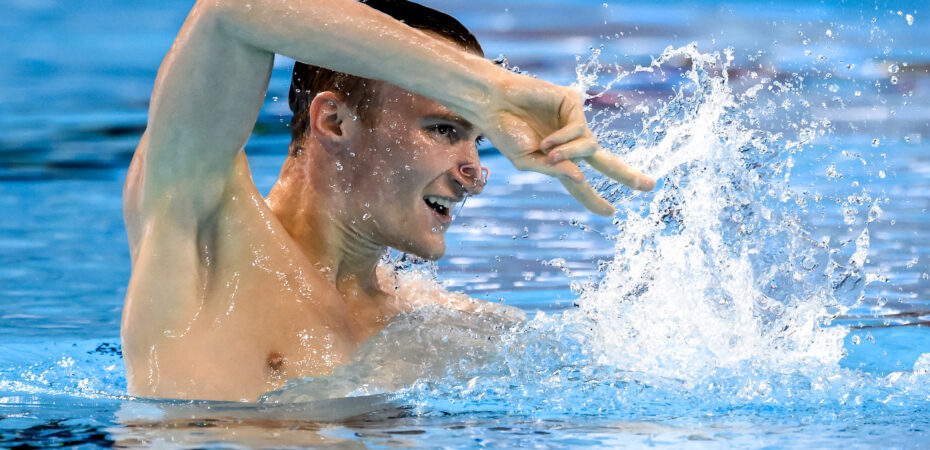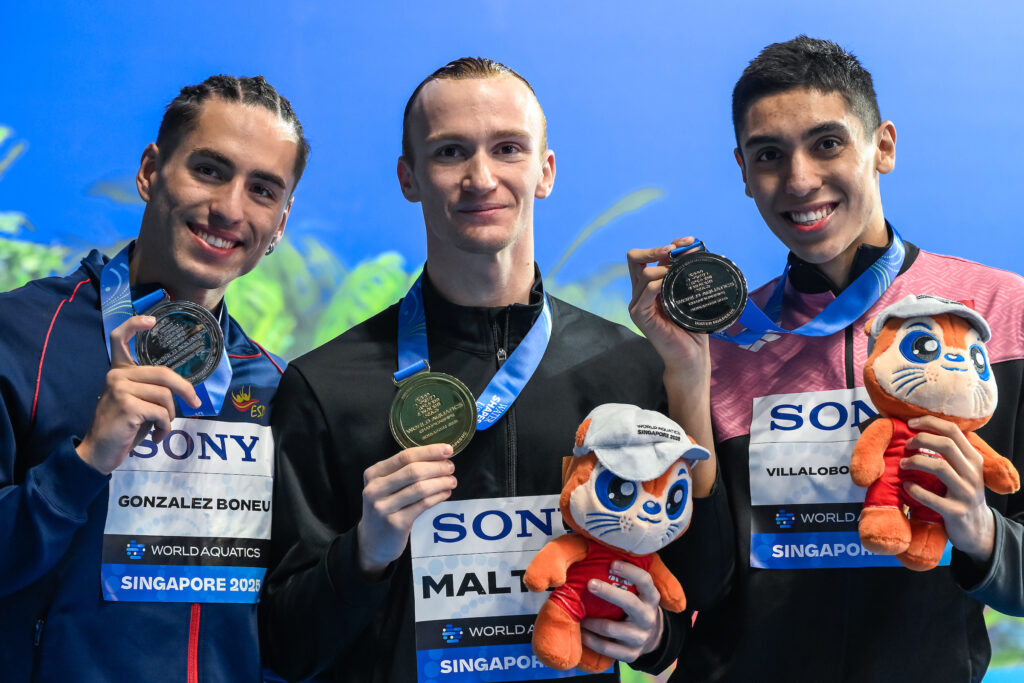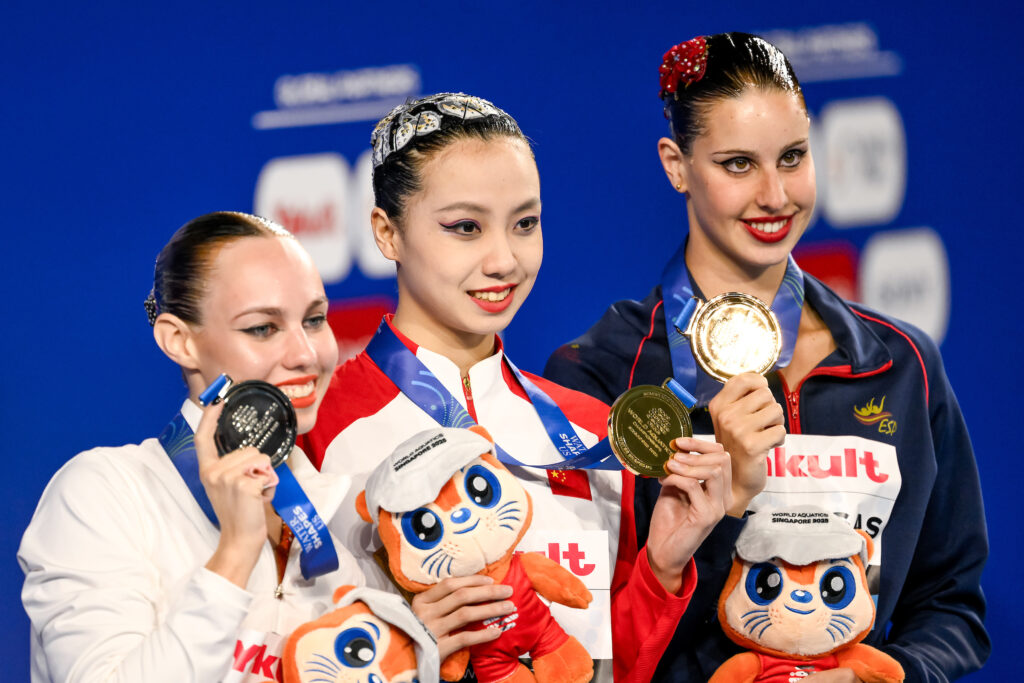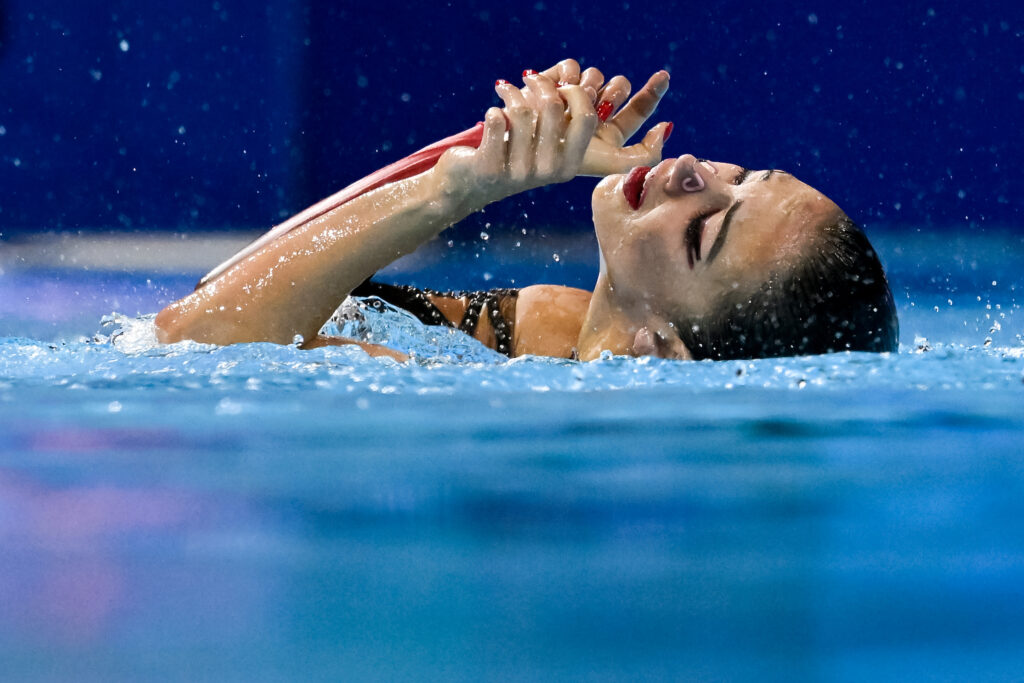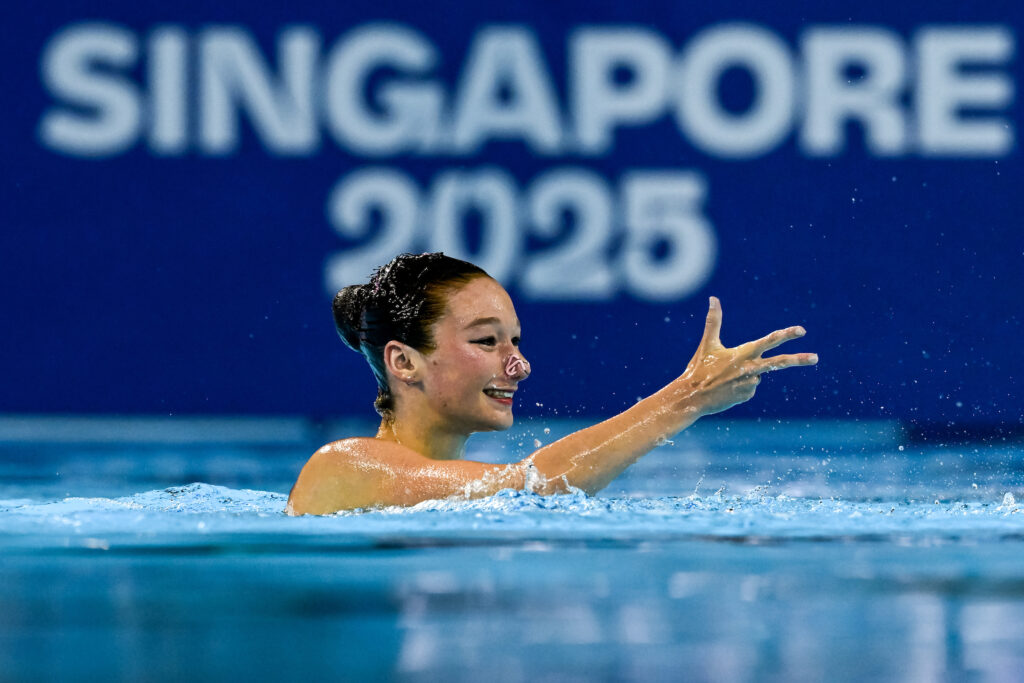Day two in Singapore brought the first medals for artistic swimming of these World Championships, and in a fitting twist for a still-evolving sport, they went to the men.
With the men’s technical solo final kicking off the medal events, followed by the women’s technical solo final, it was a day of exciting performances, historic breakthroughs, and tight battles. The free team preliminary also got underway, setting the stage for what’s shaping up to be an exciting week.
Men’s Technical Solo Final
The men’s technical solo, now in its third year at the World Championships, featured 13 athletes, an increasingly competitive field, and no preliminary round this time. The level continues to rise, and this edition saw the long-awaited solo debut of Aleksandr Maltsev, who lived up to expectations and took gold with an outstanding swim.
Aleksandr Maltsev, competing under the Neutral Athlete B designation, claimed his first solo world title gold swimming to Billy Idol’s “Rebel Yell.” The 30-year-old veteran and four-time world champion in the mixed duet was the first to swim today, and made it count.
From the opening hybrid, Maltsev was sharp, high, and exceptionally precise. His execution and score of 251.7133 were a class above, and most knew it would be nearly impossible to pass him as soon as his marks came up on screen.
“It is the first time I’m competing at the World Championships with a solo programme,” he said. “It all feels very new. It’s also my first competition in three years on the world stage so it feels like the first time. I’m happy to see a lot of excellent male athletes competing in our sport now. It’s very good for our sport, and I’m happy to compete with them. I’m happy that they showed very good swims, very artistic, technical; it’s a great pleasure to compete with them.”
The silver medal went to Dennis Gonzalez of Spain, who came into this final looking to improve on his fourth-place finish in the last World Championships in Doha.
Swimming to “Lovely” by Billie Eilish, Gonzalez earned 241.1667, notably with the highest artistic impression score of the final. His performance was emotionally grounded and more embodied, which is a major step up in presence and maturity from earlier solo outings. Gonzalez had previously admitted that the solo event had made him feel “small,” but there was nothing small about his swim today.
“I am very excited about this medal,” he said. “I didn’t have the highest difficulty, but I think the execution in the elements was better than the other times I did it, and I’m so happy about that. When I started in artistic swimming, [Aleksandr Maltsev] was my reference because he’s done it, and he won the most in my teens. I knew in this competition that it would be difficult to win against him, but I’m so happy to stand next to him on the podium.”
Rounding out the podium was Diego Villalobos of Mexico, the reigning World Junior Champion in this event, who continues to also shine on the senior stage. His bronze-medal routine to “La Maza” by Mercedes Sosa scored 238.1600, marking a strong step forward from his fifth-place finish in Doha earlier this year.
“I’m proud of my work and my performance,” he said. “Now, I say goodbye to this routine. I’ll come back with a new one, but this is the last time that I swum this. I’m happy and I’m satisfied. It’s emotional to say goodbye to this routine and win the bronze medal with it.”
Women’s Technical Solo Final
12 athletes returned from yesterday’s preliminaries to battle it out in the women’s technical solo final. While the top five remained unchanged, the margins narrowed and the pressure was high, but it was ultimately Xu Huiyan of China who rose to the occasion.
Xu, the reigning World Junior Champion, clinched her first senior world title with her “Lovesickness” routine, displaying a graceful, flowy and technically solid performance. She raised her declared difficulty by 0.55 for the final and executed it all with precision.
Bronze medalist in Doha, Xu brings the People’s Republic of China its first-ever women’s solo gold at a World Championships, a huge milestone for the country’s artistic swimming program.
“I feel good about how today went, ” she said. “It feels pretty emotional, because something I hoped for, but hadn’t dared to think about before, is now a reality before me. I needed to work on my artistic impression, that was something I was lacking in last year. The past year has been a grueling one in training for me, but it’s been a lot of growth too.”
Neutral Athlete A Vasilina Khandoshka delivered another strong and impressive routine set to “Don’t Rain on My Parade” by Barbra Streisand to claim silver, narrowly edging Spain’s Iris Tio by just 0.2499. She kept her DD of 37.40 from the preliminaries and swam cleanly, enough to hold onto her spot on the podium after finishing fourth in Doha.
“I feel good because it’s my first silver at the World Championships,” she said. “It was a very big wait and we are happy. Everybody competing was very strong; it’s a great competition and I feel the atmosphere, I like it.”
Iris Tio gave Spain its second medal of the day as she returned to the world solo stage after skipping the event last year. The 2023 world bronze medalist, she swam to the emotional song “Me Quedo Contigo” by Rosalia.
She had raised her DD by 0.7 for the final, and ultimately improved her score by nearly seven points from prelims. While it wasn’t quite enough to move up from bronze, it brought her much closer to Khandoshka, and should give her a confidence boost heading into her five other events in Singapore.
“I feel emotional,” she said. “I’m very happy to win a medal because I have improved a lot this season and I’m happy it went that way. I know that there are a lot of strong soloists this year, but this is good for me so I can improve a lot. Maybe for me, it’s more challenging because I also do teams, duet and mixed duet, on top of the solo. So I’m happy with this result and very proud.”
Behind the top three, it was also quite tight. Vasiliki Alexandri of Austria edged out Germany’s Klara Bleyer by just over half a point. Bleyer, for her part, had the highest declared difficulty of the final at 37.55 — an aggressive jump from her 35.05 in prelims — and executed it well enough to remain in the top five.
The same can’t be said for Neutral Athlete B Tatiana Gayday , whose similarly ambitious DD hike backfired. After placing seventh in the preliminaries, she had opted for a big difficulty increase, from 34.80 to 37.45 in the final to fight for a medal, but it didn’t quite go to plan.
She made it through her long free hybrid, but looked visibly worn out right after. It seemed like she might not have had quite enough gas left in the tank to properly set up the next technical element, the Thrust Continuous Spin 720°, which she didn’t execute properly and scored a zero on. That mistake cost her dearly, dropping her all the way down to 12th. Gayday will have to regroup quickly, as she competes in the technical duet final on Monday.
“We made this choice based on the results of the preliminary,” coach Elena Voronova told Match TV. “We weren’t afraid and we decided that risk is a noble thing and, in fact, we took the risk. We don’t regret it at all, because they don’t give a medal for seventh place. Tanya is an absolute fighter, so we are confident that she will be able to pull herself together and continue fighting for medals in the next events.”
Elsewhere, it is worth noting the eighth-place finish of France’s Romane Temessek, the youngest of the final at only 16 years old and competing in her first senior World Championships. Temessek, the reigning World Youth Champion in solo, only joined the senior national team last fall, but has clearly gained confidence and maturity throughout the season.
“It was a good experience,” she told the French Federation. “I really enjoyed swimming in this final also because it was the last time I did my solo this year. I felt a bit stressed, but I didn’t put too much pressure on myself. Well, I did in the preliminary rounds, because I had to get through to the final after all (smiles), but it was fine. I can really see the difference with the junior and youth categories here. It’s a great experience for me; I can tell that I’m with the big guns now and that makes a big change.”
FREE TEAM PRELIMINARY
The morning session featured 20 nations in the free team preliminary, with the top 12 advancing to tomorrow’s final.
China, the reigning Olympic and World Champion, led the field with 338.2167 for its “Gravitation” routine, delivering a strong, polished swim that once again put them at the top.
“Overall, we did do what we’re capable of in training,” Olympic Champion Feng Yu said. “But this being the first routine, we were still a bit tight. We can do even better in the final, so we’ll use the half day ahead of us to look at where we can improve further for the final. This is not our best, we can still make improvements.”
Spain impressed with a major jump in its DD going from 61.683 at the World Cup Super Final only a month ago to 70.245 here for its “Insanity” routine.
According to head coach Andrea Fuentes, the team worked to raise their DD without extending the apnea time in each hybrid, a strategy that required creativity and precise routine design. It clearly paid off, as the Spaniards are currently second with 329.4288, now less than nine points behind China.
Japan sits in third with 327.9186 on its “Buchido” routine, and after a sharp and well-executed performance that keeps them close in the medal race.
The 12 nations advancing to the final are: China, Spain, Japan, USA, Mexico, Italy, Neutral Athletes A, Kazakhstan, Greece, Brazil, North Korea, and Chile.
The final will take place Sunday, July 20 at 6:30 p.m. local time.
ARTICLE BY CHRISTINA MARMET
Cover photo: Andrea Staccioli / Deepbluemedia
If you’ve enjoyed our coverage, please consider donating to Inside Synchro! Any amount helps us run the site and travel costs to cover meets during the season

